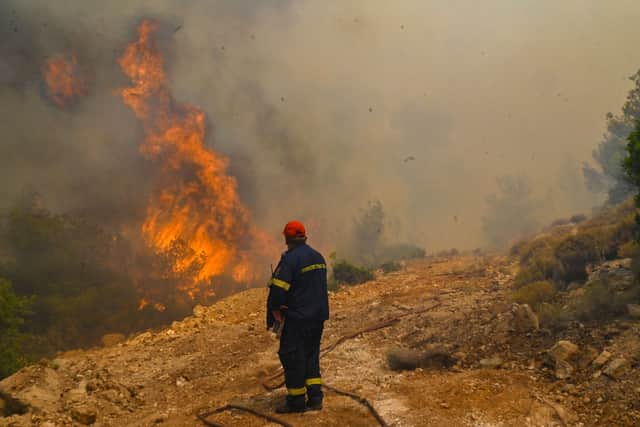Spain and Greece travel alert as UK Foreign Office issues warning amid ‘extreme’ heat
and live on Freeview channel 276
A travel safety warning has been issued to UK holidaymakers travelling to Spain and Greece amid “extreme” temperatures.
The popular European holiday destinations have been baking as a heatwave sweep across the continent, with the UN weather agency warning that temperatures in Europe could break the 48.8C record set in Sicily two years ago.
Advertisement
Hide AdAdvertisement
Hide AdBoth Spain and Greece have been battling wildfires due to the intense heat as authorities urge people to stay indoors as the hot weather persists.


The relentless heatwave conditions are keeping much of southern Europe above 40C prompting an evacuation order near the Greek capital of Athens on Wednesday (19 July) as a second heatwave hit the country.
Authorities last week introduced changes in working hours and ordered afternoon closures of the Acropolis and other ancient sites to allow workers to cope with the high heat.
But conditions are set to worsen as temperatures in southern Greece are expected to hit 44C by the end of this week, while Spain reached 45C highs on Wednesday.


Advertisement
Hide AdAdvertisement
Hide AdIn response to the scorching temperatures, the UK Foreign Office has issued a fresh alert to holidaymakers visiting Greece and Spain, with travellers urged to check with travel operators before setting off.
The updated guidance for Spain states: “Extreme temperatures are currently affecting many areas of Spain. For severe weather warnings and updates, visit the Spanish Meteorological Office (AEMET) and European Meteorological Services website.
“For information on how to take care in the heat visit the NHS website or the website of the Spanish Ministry of Health (only available in Spanish).
“You should check with your travel provider before travelling and follow the advice of local authorities at all times.”
Advertisement
Hide AdAdvertisement
Hide AdThe same guidance also applies to holidaymakers due to travel to Greece. The government body said: “Localised or severe weather extremes can affect areas of Greece over the extended summer period and this can cause travel disruption. You should:
- monitor local and international weather updates from the Greek Meteorological Service or European Meteorological Services
- check with your travel provider
- follow the advice of local authorities at all times
“Forest fires often occur during the summer months across Greece due to the dry and hot weather. In the case of wildfires, the situation can change quickly, so you should stay up to date with official advice and alerts by subscribing to the Civil Protection’s SMS or email service, or via “112 Greece” on Twitter.
“The Civil Protection Authority publishes a daily map during the high risk period detailing fire risk by area.”
Heat records are being shattered all over the world and scientists say it is likely that 2023 will become the hottest year on record, with measurements going back to the middle of the 19th century.
Advertisement
Hide AdAdvertisement
Hide AdThe UN’s World Meteorological Organisation (VMO) has said that unprecedented sea surface temperatures and low Arctic sea-ice levels are largely to blame for the rising heat, adding that human-caused climate change from the burning of coal, oil and natural gas is making the world hotter.
Comment Guidelines
National World encourages reader discussion on our stories. User feedback, insights and back-and-forth exchanges add a rich layer of context to reporting. Please review our Community Guidelines before commenting.
